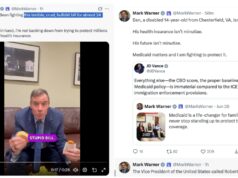From Sen. Mark Warner:
WARNER, BLUMENTHAL RAISE ALARM ABOUT GOOGLE ADS THAT CONTINUE TO MONETIZE COVID-19 FEARS
~ Shortage of essential products like facemasks directly affects health care workers responding to the COVID-19 outbreak ~
WASHINGTON – Today, U.S. Sens. Mark R. Warner (D-VA) and Richard Blumenthal (D-CT) expressed deep concern that Google – despite claiming to ban ads that capitalize on novel coronavirus (COVID-19) fears – continues to run ads for products such as face masks and hand sanitizer, which not only exploit fear for profit but also serve to trigger shortages of essential health care products at a time of critical need. In their letter to the Federal Trade Commission (FTC), the Senators slammed Google’s inattention to the misuse of its advertising platform and urged the FTC to intervene in order to protect the public and the nation’s supply chains.
“Browsing in incognito mode across a range of different devices, our staffs were consistently served dozens of ads for protective masks and hand sanitizer – in each case while on a page related to COVID-19,” the Senators wrote. “Scrutinizing the targeting information that Google provides pursuant to the AdChoices program, it became clear that these ads were targeted to users specifically because they were browsing articles on COVID-19. In other words, using browsing data that Google collects through its third-party web trackers, unscrupulous and predatory advertisers were able to directly target consumers browsing content on the outbreak in order to exploit their fear for profit.”
“Google has made repeated representations to consumers that its policies prohibit ads for products such as protective masks. Yet the company appears not to be taking even rudimentary steps to enforce that policy, such as easily automated and scalable actions like flagging ads with relevant terms in the outbound URL. These misrepresentations generate direct harm to consumers, exploiting their legitimate fears over the COVID-19 outbreak to over-charge them for products. They also create widespread social harms to our nation’s response to this crisis, such as by contributing to shortages of products essential to the health care workers on the front lines of the COVID-19 response,” they continued. “Consumers should be able to rely on representations regarding a company’s business practices – particularly in cases, such as this, where Google has acknowledged that offending ads pose harm to consumers. If consumers cannot rely on a company’s representations, then the FTC must intervene.”
Earlier this month, the Department of Health and Human Services (HHS) announced that in light of the COVID-19 outbreak, it would need roughly 300 million N95 respirator masks – 270 million more masks than it currently has stockpiled. Due to this shortage, the U.S. Surgeon General urged the public to stop buying protective masks in order to ensure that health care workers have access to the resources they need to stay safe.
On March 10, after several outlets reported that Google was serving these ads despite a policy that prohibits content that capitalizes off sensitive events, Google stated that it would formally ban ads for protective facemasks. However Google’s advertising platform continues to be exploited for fraudulent activity with these ads continuing to run, notably even on news articles reporting Google’s new policies.
In their letter, the Senators also highlighted previous efforts to encourage the FTC to address Google’s inattention to abuse and expressed disappointment with the FTC’s inaction.
A copy of the letter is available here and below. A list of Sen. Warner’s work to protect Americans amid the coronavirus outbreak is available here.
The Honorable Joseph J. Simons
Chairman
Federal Trade Commission
600 Pennsylvania Avenue, NW
Washington, D.C. 20530
Dear Chairman Simons,
The COVID-19 pandemic has impaired the global supply chain in myriad ways, but perhaps most notably by creating a shortage of products like protective face masks, which are needed by health care workers responding to this crisis. Major manufacturers like 3M are ramping up production in the wake of consumer-led shortages that are impacting supplies for the health care sector. In early March, the Department of Health and Human Services stated that while the U.S. has a stockpile of roughly 30 million N95 respirator masks, it needs roughly 300 million as the COVID-19 outbreak worsens. In light of this, the U.S. Surgeon General has urged the public to stop buying protective masks.
Despite these pleas, a range of bad actors have continued to exploit fears surrounding the COVID-19 crisis for monetary gain. Earlier this month, CNBC and other outlets reported that Google was continually serving ads for products marketed as precautions for COVID-19 (including protective masks and hand sanitizer), despite a policy prohibiting content that capitalizes off of “sensitive events” such as natural disasters, conflicts, or death. On March 10th, Google announced a formal ban on ads for protective face masks and claimed it would “take action as needed to protect users.”
Almost immediately, however, our staffs became aware that Google continued to serve ads for these masks – including, notably, on news articles reporting Google’s new policies. Browsing in incognito mode across a range of different devices, our staffs were consistently served dozens of ads for protective masks and hand sanitizer – in each case while on a page related to COVID-19. Scrutinizing the targeting information that Google provides pursuant to the AdChoices program, it became clear that these ads were targeted to users specifically because they were browsing articles on COVID-19. In other words, using browsing data that Google collects through its third-party web trackers, unscrupulous and predatory advertisers were able to directly target consumers browsing content on the outbreak in order to exploit their fear for profit.
These ads, from a range of different advertisers, were served by Google on websites for outlets such as The New York Times, The Boston Globe, The Washington Post, CNBC, The Irish Times, and myriad local broadcasting affiliates. In several hours of testing, our staffs were not served a single ad for such masks from other advertising platforms – yet generated several dozen from Google. Reporting by CNBC appears to confirm that other ad platforms seemed not to be serving such predatory ads.
Upon contacting the company, Google claimed it would need a full click string to detect these violations – a request that seemed odd in light of the sheer number of ads violating these policies and the ease with which our staffs were able to generate offending ads, across multiple devices and sites. Most disturbingly, the ad content included explicit references to “Protective Masks” and included a range of representations such as “Medical-Grade N95 filter mask.” The majority of these ads also suggested that consumers should take immediate action in light of “limited supplies.” Virtually every single outbound URL associated with these ads also contained clear indications that the ads violated the company’s policies – with “N95,” “mask,” “medical-grade,” and “3M-Mask” explicitly in the URL string. In addition to the social harm associated with contributing towards scarcity of these masks, the ads also appear to engage in price-gouging – with individual masks in many ads selling for $9.99 or $12.99.
For several years now, we have encouraged the FTC to address Google’s inattention to abuse, harmful activity, and fraud within the ad ecosystem that it largely dominates. As one of us wrote your agency in 2018, “The FTC’s failure to act has had the effect of allowing Google to structure its own market; through a series of transactions, the company has accomplished a level of vertical integration that, in effect, allows it to act as the equivalent of market-maker, commodities broker, and commodities exchange for digital advertising… While the company controls each link in the supply chain and therefore maintains the power to monitor activity in the digital advertising market from start to finish, it has continued to be caught flat-footed in identifying and addressing digital ad fraud.”
Google’s inattention to the misuse of its advertising platform extends beyond digital ad fraud and predatory ads: in 2012, the Department of Justice announced one of the largest forfeitures in U.S. history, forcing Google to disgorge $500 million generated by unlawful ads marketing opioids to Americans. Unfortunately, we have continued to see Google’s advertising platform exploited for abusive and fraudulent activity.
Google has made repeated representations to consumers that its policies prohibit ads for products such as protective masks. Yet the company appears not to be taking even rudimentary steps to enforce that policy, such as easily automated and scalable actions like flagging ads with relevant terms in the outbound URL. These misrepresentations generate direct harm to consumers, exploiting their legitimate fears over the COVID-19 outbreak to over-charge them for products. They also create widespread social harms to our nation’s response to this crisis, such as by contributing to shortages of products essential to the health care workers on the front lines of the COVID-19 response.
Consumers should be able to rely on representations regarding a company’s business practices – particularly in cases, such as this, where Google has acknowledged that offending ads pose harm to consumers. If consumers cannot rely on a company’s representations, then the FTC must intervene. The FTC routinely pursues enforcement actions against companies that don’t live up to the self-regulatory commitments they make, including in a 2012 case against Google for failing to follow the National Advertising Initiative code of conduct.
Given the Department of Justice (DOJ)’s successful work in combatting similar misuse of the company’s advertising platform, we have provided a carbon copy of this letter to the DOJ to address this pattern of misbehavior in light of the FTC’s inaction.
Sincerely,
Cc:
Attorney General William Barr
Commissioner Rohit Chopra
Commissioner Rebecca Slaughter
Commissioner Noah Phillips
Commissioner Christine Wilson


 Sign up for the Blue Virginia breaking news newsletter
Sign up for the Blue Virginia breaking news newsletter






![[UPDATED with Video of the Event] Billboard Truck Highlights GOP Ticket Chaos and Infighting Outside of Winsome Earle-Sears’ Campaign Event](https://bluevirginia.us/wp-content/uploads/2025/07/reidtruck2-100x75.jpg)

![“Attorney General [Jason Miyares] is a coward who refuses to defend our state’s laws [against so-called ‘conversion therapy’] that demonstrably prevent suicide”; “Glenn Youngkin is simply despicable”](https://bluevirginia.us/wp-content/uploads/2025/07/youngkindespicable-100x75.jpg)